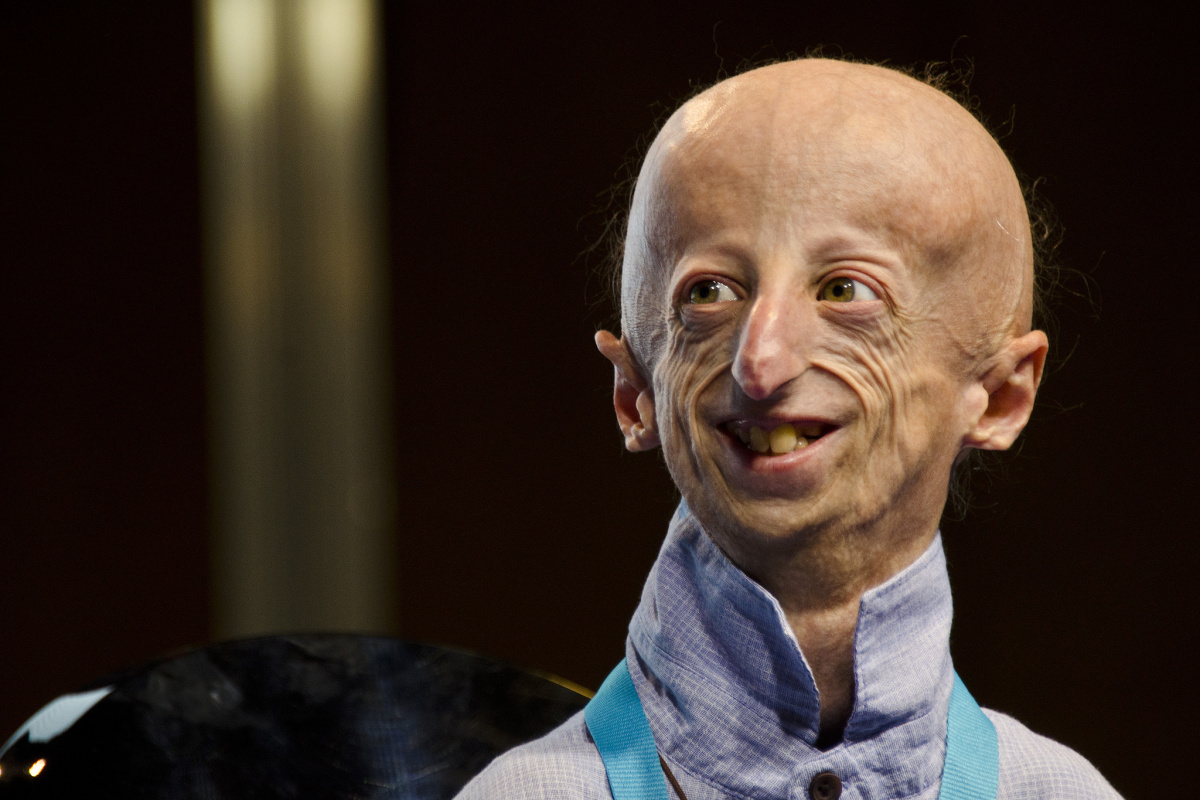English and French student Stephanie Green is currently doing an internship with the charity EURORDIS – Rare Diseases Europe in Paris. In time for Rare Disease Day 2018, she had the opportunity to speak to Sammy Basso, the world’s eldest person living with Hutchinson-Gilford Progeria.
“Happiness is often a choice and not a chance”
Something that immediately strikes you about Sammy is his positive outlook on life. “Happiness is often a choice and not a chance”, Sammy says. “Every occasion to be happy should be welcomed with all the enthusiasm we have in our body!”
Sammy Basso was born in Schio, Italy, in 1995. At two months old, doctors first became aware that Sammy was experiencing problems and, after many months of frustration and worry, he was diagnosed with Hutchinson-Gilford Progeria, also known as ‘premature ageing’ syndrome. Sammy is the eldest of only 130 people in the world living with progeria, and so the limitations of living with a rare disease are even stronger – from feelings of isolation to finding poor access to treatment.
Progeria is an extremely rare autosomal dominant genetic disorder in which symptoms resembling aspects of aging are manifested at a very early age, and those born with progeria typically live to their mid-teens to early twenties. In 2003, the cause of progeria was discovered to be a point mutation in position 1824 of the LMNA gene, in which cytosine is replaced with thymine. This mutation leads to an abnormal mRNA transcript, which in turn yields an abnormal variant of the prelamin A protein when translated. This protein, referred to as progerin, gets permanently affixed to the rim of the cell nucleus, and therefore can’t become part of the nuclear lamina. Without lamin A, the nuclear lamina is unable to provide the nuclear envelope with adequate structural support, causing it to take on an abnormal shape. The nuclear lamina normally provides support for the organisation of chromatin during mitosis and thus, its weakening limits the ability of the cell to divide normally. The condition causes wrinkled skin, atherosclerosis, kidney failure, loss of eyesight, scleroderma and cardiovascular problems.
The possible limitations of living with such a rare condition have not dampened Sammy’s powerful motivation to help his community. “When, in 2000, doctors told my parents that I have progeria, they said that there was no research, no hope for a better life. Now everything is different, and I don’t want any more families to feel how we’ve felt in the past.” When he was only 9 years old, Sammy and his parents created Sammy’s own advocacy group and patient organisation, l’Associazione Italiana Progeria Sammy Basso, which has been instrumental in informing the general public about, and promoting the need for, progeria research. “Researchers are starting to collaborate more and more, but we can always do better. I think that collaboration is the most important value to be cultivated”, Sammy says. “The difficult part is to convince them to work together, as a single world group, each with its own peculiarities.”
Sammy has already been instrumental in promoting this research when his association, along with the National Research Center of Bologna, founded the Italian Network for Laminopathies – a group of Clinical and Research Centers performing clinical and molecular diagnosis or biomedical research in the field of laminopathies. Sammy himself is a budding researcher, passionate about molecular biology and currently a university student. “I would like to contribute to the growth of science and I want to help people”, he says. “Just turn on the television or read newspapers and we are inundated with bad news. We can think that the world is a bad place. But, thanks to many people I see that are involved in research, I see that the world is a good place.”
When asked about where his positive spirit comes from, he explains that it comes from several places. “When I feel sad, I think of my friends, my family, I think of all the people who are helping me”, he says. “My family give me all the values that are dear to me: faith, truth, willpower, love, honestly and a good dose of stubbornness. They are always by my side: together we are a great team.”

With the theme of Rare Disease Day 2018 being research, Sammy’s views on the importance of collaborative research is extremely relevant. Sammy stresses that putting research in contact with patients is key, with patient-centric care being above and beyond the most important stance that research should take. He says that “often there is an opinion that research is competition – but for the families of patients research is hope, research is life!”
Stephanie Green
Images: Aleteia.org & Genes, unzipped!

